US Charges Four In Connection To Death Of Navy Seals

Four men were charged on Thursday in connection with a vessel that was intercepted by the US Navy in January while allegedly transporting Iranian-made weapons, the US Justice Department said.

Four men were charged on Thursday in connection with a vessel that was intercepted by the US Navy in January while allegedly transporting Iranian-made weapons, the US Justice Department said.
Two US Navy SEALs were reported missing after boarding the unflagged vessel in a Jan. 11 operation near the coast of Somalia. They were declared deceased 10 days later after an exhaustive search.
"Two Navy SEALs tragically lost their lives in the operation that thwarted the defendants charged today from allegedly smuggling Iranian-made weapons that the Houthis could have used to target American forces and threaten freedom of navigation and a vital artery for commerce," Deputy Attorney General Lisa Monaco said in announcing the charges.
The US has carried out a string of strikes against Houthi targets in Yemen in response to the group's attacks on merchant ships in the Red Sea that have disrupted global trade and raised fears of supply bottlenecks.
The Justice Department said the boat's captain, Muhammad Pahlawan, had been charged in a criminal complaint with transporting by ship explosives that he knew were intended to cause death or harm and with lying to the federal agents who boarded the vessel.
Mohammad Mazhar, Ghufran Ullah and Izhar Muhammad were each charged with lying to the federal agents. The four men were carrying Pakistani identification, prosecutors said in the criminal complaint.
A search of the boat following the raid turned up what are believed to be Iranian-made advanced weaponry, including components for medium-range ballistic missiles and anti-ship cruise missiles.
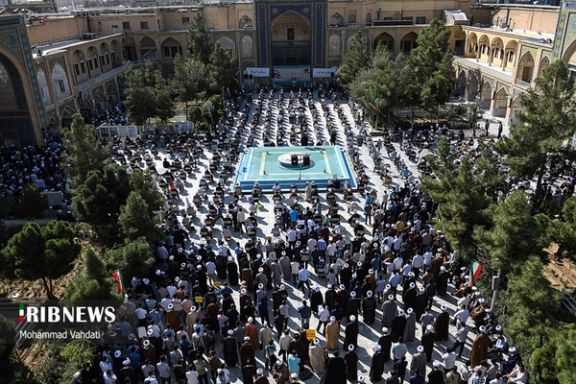
The Assembly of Qom Seminary Scholars and Researchers of Iran has claimed "the elections have lost their meaning" in the country on the eve of the upcoming polls in the country.
The group also announced its decision to abstain from providing a list for the introduction of candidates for the Assembly of Experts and the parliament.
The proclamation comes in the wake of a recent round of elections marked by what the organization describes as a “narrow-minded approach leading to broader restrictions, leaving many citizens disheartened and disillusioned, ultimately turning them away from the ballot boxes.”
The Assembly highlighted the significant decline in voter participation in several recent elections, the government continually narrowing the field of choice for the electorate.
The Assembly branded the government ineffective amid mass discontent, pointing out that “the capabilities of electoral, legislative, and executive institutions have been restricted, rendering people's choices ineffective.”
The organization called for “a restoration of meritocracy in governance, urging rulers to abandon the current mode of governance to restore confidence in the electoral process and encourage greater participation among citizens.”
Meanwhile, various political groups, including the Reform Front, comprising more than two dozen reformist parties, have declared their refusal to participate in the upcoming elections, citing concerns about its lack of competitiveness and fairness.
The upcoming parliamentary and Assembly of Experts elections, scheduled for March 1, are anticipated to witness historically low voter turnout, reflecting a crisis of legitimacy for the Islamic Republic.
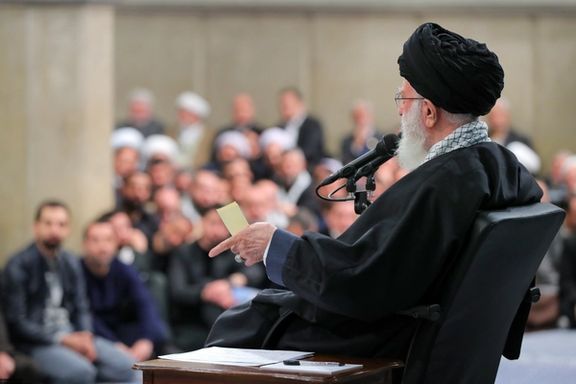
Iran's Supreme Leader Ali Khamenei has once again criticized other Islamic countries for not severing all relations with Israel, and called for the destruction of the Jewish state.
During a speech on Thursday, Khamenei reiterated his belief in political Islam and Islam as the cornerstone of social structure, accusing heads of Islamic states of failing to follow the teachings of the Quran regarding Gaza. He stated, "The Almighty God will question the Muslim nations because they did not put pressure on their governments to stop supporting the Zionist regime as well as the Islamic governments because they did not follow the Quranic orders."
Khamenei questioned the actions of leaders of Muslim countries, asking whether they are adhering to the Quran's commandment not to “establish connections with the enemies of God and enemies of Muslims? And why the heads of Islamic countries are not openly severing their ties with the murderous Zionist regime and stopping to help that regime?" he asked while stressing that the Gaza war is the biggest current issue of the Islamic world.
Iran's leader also claimed that those who are fighting Israel, who he called the brave Resistance movement, are enacting the teachings of the holy book of Islam and promised that the “Zionist cancerous tumor” would be overthrown and destroyed.
Although Khamenei did not directly mention militant forces acting as proxies for Iran, such as the Houthis in Yemen, he has previously in early November called on Muslim nations to blockade Israel. While initially cautious about the Gaza-Israel conflict, Khamenei later urged Muslim states with political connections to Israel to temporarily sever ties. He also advocated for an Islamic oil and food embargo on Israel to force a ceasefire amid the conflict sparked by Hamas attacks in October.
After his call for a blockade of Israel, Houthis began firing missiles and drones on commercial and even naval vessels in the Red Sea region, disrupting global shipping. The United States and Britain have launched retaliatory air strikes at Houthi military installations.
"Some Islamic governments have condemned Israeli crimes in assemblies while others have not. This is unacceptable," Khamenei said in a speech to students on November 19 in which he also claimed that Israel had been defeated by Hamas. It was unclear which nations he was referring to as countries across the Arab world had all stood by Gaza in the wake of the war declared by Hamas on October 7.
Some Islamic countries including Turkey and Jordan expelled Israeli envoys after the conflict began, but Bahrain’s Crown Prince and Prime Minister Salman bin Hamad Al Khalifa became the first Arab leader on November 19 to “unequivocally” condemn the Hamas attacks on Israel and urge the militants to release Israeli hostages.
On February 8, Khamenei reiterated his call for a blockade of Israel. “It is the duty of the governments to cut off political, propaganda and arms aid and not to send consumer goods to the Zionist regime,” Khamenei said.
Tehran has avoided any direct military involvement in the Israel-Hamas conflict but has used its proxy groups such as the Houthis and Hezbollah to attack Israeli and American targets in the region in the wake of the October 7 Hamas attack. There were more than 160 rocket and drone attacks on American forces stationed in Iraq and Syria since mid-October, until the US launched air strikes against dozens of target in late January.
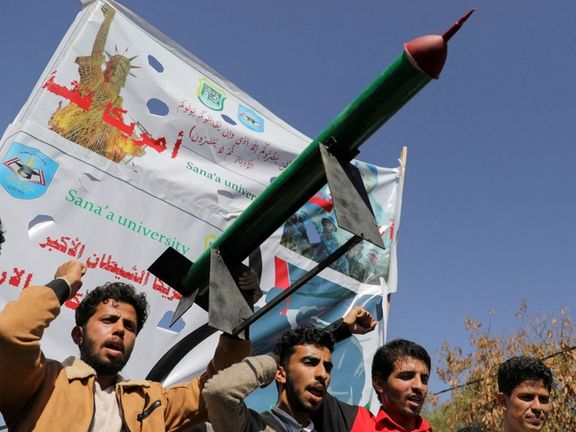
The Iran-backed Houthis in Yemen announced Thursday that in addition to its blockade on Israeli ships, American and British ships are barred from transiting through the Red Sea.
Vessels wholly or partly owned by Israeli individuals and entities, as well as vessels with the Israeli flag, were prohibited from the Red Sea, the Gulf of Aden and the Arabian Sea since November. The militia blockaded the critical trade route in allegiance with Iran-backed Hamas amidst the worst Gaza war since the terror group took control of the strip.
The Houthis' Humanitarian Operations Coordination Center said the blockade now applies to the UK and US which have launched dual attacks on the group's capabilities in Yemen and been at the helm of an international coalition of over 20 countries to counter the offensive which has had massive impacts on global trade and shipping.
The blockade, aiming to force Israel into a ceasefire, has seen multiple attacks on shipping since November, including the hijacking of the Galaxy Leader and its 25 crew members.
On Thursday, the latest Houthi attack saw a UK-owned, Palau-flagged cargo ship targeted by two missiles 70 nautical miles southeast of the Yemeni port city of Aden. The attack set the ship on fire, Reuters reported.
According to maritime security firm Ambry, the vessel named “Islander” was sailing from Thailand to Egypt when it was hit in the waters of the region. US-led coalition forces responded to the attack.
On January 10, the UN Security Council passed a resolution calling on the Houthis to stop attacks on shipping immediately, which has had no impact on the group recently redesignated by the US.
Also on Thursday, the emboldened Yemeni group targeted the southern Israeli town of Eilat, intercepted by Israel.

Iran's former president, Hassan Rouhani, has again appealed to the Guardian Council to demand answers as to his disqualification in the upcoming Assembly of Experts elections.
According to Rouhani's official website, he submitted his request on Wednesday, underscoring the lack of response to his two previous inquiries as the basis for his latest request.
The announcement of Rouhani's disqualification was made on January 24th, as he currently holds a position as a member of the Assembly of Experts, the deliberative body empowered to appoint the Supreme Leader of Iran.
In response to his disqualification, Rouhani had previously called on the public to actively participate in the forthcoming elections and cast what he termed a "protest vote."
Hadi Tahan Nazif, spokesperson for the Guardian Council, addressed the council's silence regarding Rouhani's letters, claiming that their priority is to review the eligibility of those who have lodged complaints. He said that they will address Rouhani's inquiry, emphasizing it as his legal right.
Amidst the debacle, the state-run news agency IRNA last month denied the lodging of a formal complaint, while Alireza A’arafi, a member of the clerics of the Guardian Council, responded to Rouhani's latest letter, acknowledging the call for a swifter response and assuring that they will promptly address the matter.
The instance is not the first time the Guardian Council has invalidated the eligibility of a former president for elections. Akbar Hashemi Rafsanjani and Mahmoud Ahmadinejad both faced similar disqualifications for presidential elections.
The upcoming sixth round of Assembly of Experts elections is scheduled for March 1, 2024, concurrently with the twelfth parliamentary elections.
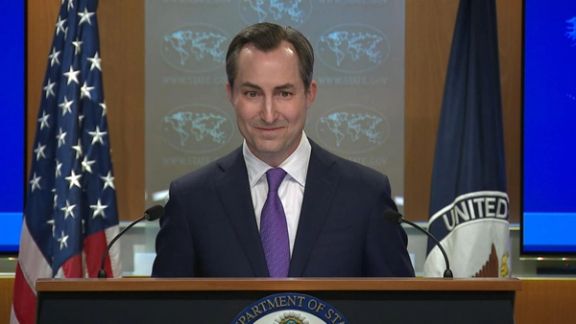
The United States has called Iran's decision to ban the use of virtual private network (VPN) services a "reminder of how much the Iranian regime fears its people".
Spokesman Matthew Miller made the comments amid Iran's lowest ebb, when on the eve of next month's elections, turnout is expected to be the lowest in the history of the Islamic Republic.
Miller said the government fears "what they [Iranians] are capable of when they are given unfettered access to the internet and information", the 2022 uprising and its subsequent rejection of the government reflecting the power of the people in the face of the country's tyrannical regime.
Blaming Tehran for “choking off information that people need to make decisions about their lives and decisions about their futures,” Miller stressed that the regime’s policies to restrict the virtual space have harmed businesses and cost Iran’s economy billions of dollars.
Iran’s National Virtual Space Center announced a resolution banning the use of VPNs in the country on Tuesday, approved by Supreme Leader Ali Khamenei.
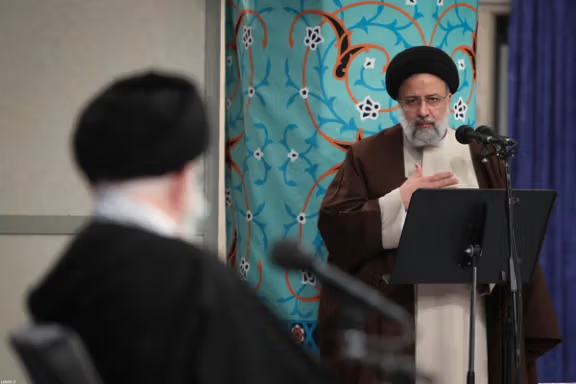
“Employing VPN devices is prohibited, except for those with a legal permit,” the resolution stated, without specifying who will be eligible for the permits and what actions and purposes will be allowed under the new law.
During the press conference, Miller also vowed that Washington will continue its support for internet freedom in Iran, an integral part of the US campaign to further the cause of human rights in the country.
“In the height of the protests in 2022 and 2023, as many as one in three Iranians used US-supported anti-censorship and digital security tools such as VPNs. There are millions of Iranians that have continued to use those tools to this day,” Miller went on to say.
Since the Women, Life, Freedom uprising, sparked by the death in morality-police custody of Mahsa Amini, the likes of Instagram and Whatsapp have been banned. For millions of small businesses, it has been crippling. Many small businesses depend on such platforms, not least, women in remote regions.
Miller’s remarks come against the backdrop of mounting criticisms against US President Joe Biden over his policies regarding Tehran. Many Iranian activists and opposition figures, as well as American politicians, accuse the Biden administration of being too lenient towards Iran.
Iran's disruption of VPN networks has been coupled with an ongoing surge in internet crackdowns to silence opposition voices. The disruptions have led to decreased internet access speed, exacerbating concerns over online censorship and surveillance in Iran.
The latest bans come amid a broader crackdown on internet freedom activists. Among those detained is Youssef Ghobadi whose unofficial detention has sparked widespread outcry, along with the arrest of another activist known as "Segaro," who was active on the X platform. The two had been working to develop and distribute circumvention tools such as VPNs to help Iranians bypass internet censorship.
In last year's Freedom House report, the NGO stated "Iran experienced the worst score decline among the countries assessed, driven by the authorities’ disproportionate and violent crackdown on nationwide anti-government protests". It noted that "the government also shut down internet services, blocked WhatsApp and Instagram, and expanded its repressive surveillance apparatus".